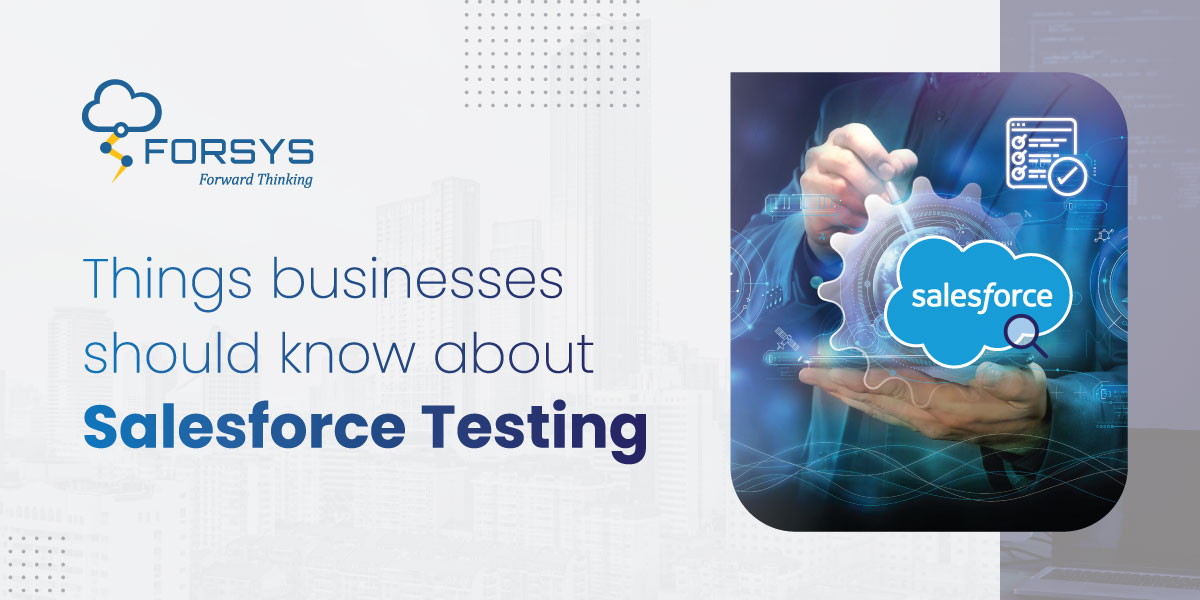Nowadays businesses are investing a lot of time and effort into satisfying the customer base with a focus on quick and effective customer interactions, thus underlining the need for Salesforce tools that help to identify more prospects, close deals fast, and wow customers with superb service.

In such a situation, if any organization’s Salesforce platform which unites the sales, service, marketing, commerce, and IT teams with a unified view of customer information comes to a grinding halt, customers will churn jeopardizing the business & revenue growth.
So to ensure that all those business processes that are driven by Salesforce are working the way they should be, organizations should opt for Salesforce Testing.
Benefits of Salesforce Testing include:
- Verifies that the setup and codes are functioning properly.
- Ensures the completed system is capable of handling the business operations.
- Confirms that the system’s first construction meets the agreed-upon specifications.
- Enables easy detection and quickly resolves issues.
- Allows designing the functional flows to support an easy understanding of the software/platform.
- Seamlessly test the system’s operation and behavior.
- Enables testing the functionality of time-based activities.
Levels of testing supported in Salesforce Both manual and automated testing approach works in Salesforce, but the level of testing varies as mentioned below:
- Unit Testing is mainly executed mainly to test the functionality of the written code and is never restricted to any specific user scenarios.
- System Testing focuses on use cases and functional system requirements where the testers aren’t expected to understand the code.
- User Acceptance Testing assesses and reviews if the system follows/meets the business, technical, and aesthetic requirements to ensure end-users are complacent.
- End-to-End Testing is performed by QA and end-users in the staging environment to ensure the proper functioning of the system.
- Regression Testing helps to find out if any custom feature has impacted the working of any other functionality.
Challenges in Salesforce Testing
- SF Classic supports the latest IE 11 version but is not supported by Lightning.
- SF Lightning doesn’t allow private browsing in the latest version of firefox but classic does.
- Standard mail merge or extended mail merge is a Salesforce Classic only feature and few customer applications like Connect Offline work only on the IE.
Validate customized Salesforce functionalities & integrations with Forsys
Forsys’ Salesforce testing services enable businesses to validate configuration and customization performed in Vanilla SFDC. We verify that the system’s initial build meets the agreed requirement and provide proprietary test accelerators and pre-packaged testing kits comprising test strategy, guidelines, templates, checklists, manual test cases, regression suits, and the end-to-end automated test scripts with a continuous testing approach.
Our testing offerings cover all modules of Salesforce cloud applications including Sales Cloud, Service Cloud, Marketing Cloud and Community Cloud. Our Salesforce Testing Center of Excellence (CoE) enables life cycle testing services to help organizations successfully implement Salesforce.com or build Salesforce.com applications.
Here are our key differentiators:
- Open source-backed QA Framework to allow root cause analysis ensuring zero-defect UAT implementation
- Built & managed 12+ Testing Center of Excellence (TCoEs)
- Executed 100+ QA projects.
- Certified testing professionals (ISTQB/SCRUM/ ISEB/CSQA/CSTE, Salesforce Admin, Salesforce CPQ, Sales Cloud & Service Cloud)
- 500+ man-years of testing experience.
To learn more about our Salesforce Testing solutions in detail and proven track record of achieving 90% accuracy and reducing testing cycle time by >40%, connect with us.

